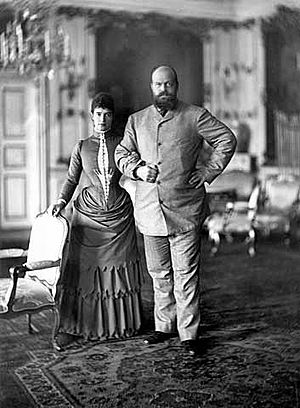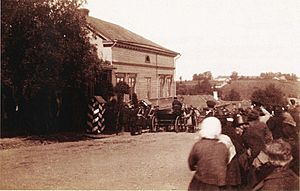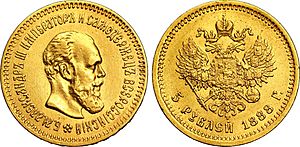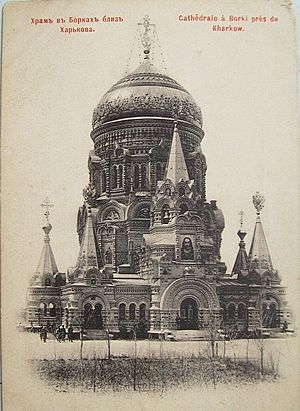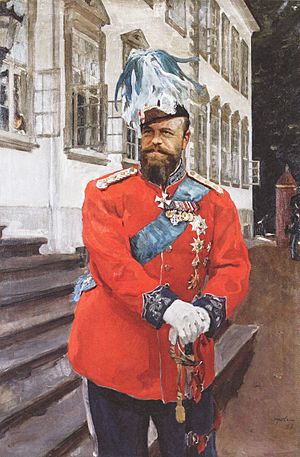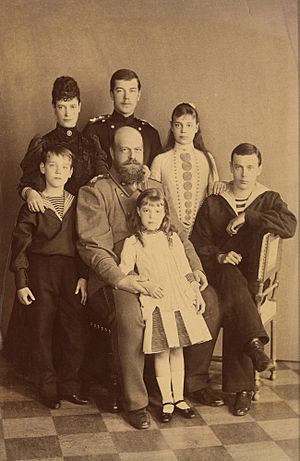Alexander III of Russia facts for kids
Quick facts for kids Alexander III |
|||||
|---|---|---|---|---|---|
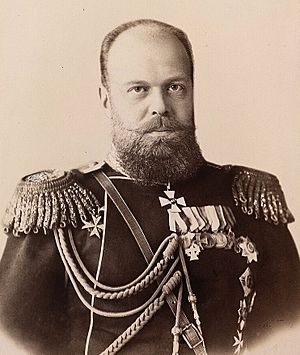
Portrait photograph published by Mikhail Stasyulevich, 1883
|
|||||
| Emperor of Russia King of Congress Poland Grand Duke of Finland |
|||||
| Reign | 13 March 1881 – 1 November 1894 | ||||
| Coronation | 27 May 1883 | ||||
| Predecessor | Alexander II | ||||
| Successor | Nicholas II | ||||
| Born | 10 March 1845 Winter Palace, Saint Petersburg, Russian Empire |
||||
| Died | 1 November 1894 (aged 49) Maley Palace, Livadia, Taurida Governorate, Russian Empire |
||||
| Burial | 18 November 1894 Peter and Paul Cathedral, Saint Petersburg, Russian Empire |
||||
| Spouse | |||||
| Issue Detail |
|
||||
|
|||||
| House | Romanov-Holstein-Gottorp | ||||
| Father | Alexander II of Russia | ||||
| Mother | Marie of Hesse and by Rhine | ||||
| Religion | Russian Orthodox | ||||
| Signature | |||||
Alexander III (born March 10, 1845 – died November 1, 1894) was the Emperor of Russia. He also ruled as the King of Congress Poland and the Grand Duke of Finland from 1881 until his death in 1894.
Alexander III was known for being very traditional. He changed some of the modern ideas his father, Alexander II, had introduced. These changes were called "counter-reforms" in Russia. He believed in keeping his power as an absolute ruler, meaning he had total control. He was influenced by Konstantin Pobedonostsev, who advised him against reforms that would limit his power.
During his time as emperor, Russia did not fight any major wars. Because of this, he earned the nickname "The Peacemaker."
Alexander was also known for his strong and large build. An American historian described him as a "tall, heavy-set man, of enormous muscular strength." A big achievement in his foreign policy was helping to create the Russo-French Alliance. This alliance changed how Russia interacted with other countries around the world.
Contents
Who Was Alexander III?
Grand Duke Alexander Alexandrovich was born on March 10, 1845. His birthplace was the Winter Palace in Saint Petersburg, Russia. He was the second son of Tsesarevich Alexander (who later became Emperor Alexander II) and his wife Maria Alexandrovna. He was born when his grandfather, Nicholas I, was the emperor.
Alexander was very different from his kind and modern father. He was also unlike his clever and emotional great-uncle, Emperor Alexander I. Even though Alexander loved music and supported ballet, he was not seen as very refined or elegant. He actually liked the idea of being a bit rough, like some of his people. He was direct and sometimes a bit gruff in how he spoke. His education did not change these traits.
Alexander was incredibly strong. He could tear a deck of cards in half with his bare hands to entertain his children. Once, when an ambassador from Austria-Hungary threatened Russia, Alexander twisted a silver fork into a knot. He threw it on the ambassador's plate and said, "That is what I am going to do to your two or three army corps."
Unlike his outgoing wife, Maria Feodorovna, Alexander did not like social events. He tried to avoid St. Petersburg. At palace parties, he would get impatient for them to end. He would even tell the musicians to leave and turn off the lights until the guests went home.
Alexander was also afraid of horses. When he was a child, he had a bad experience with a difficult horse. His wife once convinced him to go for a carriage ride. As he got into the carriage, the ponies stood up on their back legs. He immediately got out and would not get back in, no matter how much his wife asked.
Becoming the Future Emperor
For the first 20 years of his life, Alexander was not expected to become emperor. He had an older brother named Nicholas, who seemed very healthy. Even when Nicholas started to show signs of illness, no one thought he would die young. Nicholas was even engaged to Princess Dagmar of Denmark. Her family included future kings and queens of Denmark, the United Kingdom, and Greece.
Nicholas received a special education to prepare him to be the future emperor. Alexander, however, received the usual training for a Grand Duke. This included learning French, English, and German, as well as military training.
As the Crown Prince
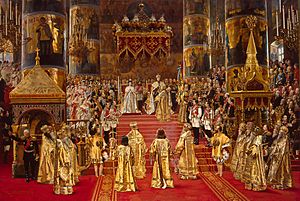
Alexander became the tsesarevich (crown prince) after Nicholas's sudden death in 1865. He was very close to his older brother and was heartbroken by his death. When he became emperor, he said that "no one had such an impact on my life as my dear brother and friend Nixa [Nicholas]." He felt a "terrible responsibility" fell on him when Nicholas died.
As crown prince, Alexander began to study law and government. His teacher was Konstantin Pobedonostsev. Pobedonostsev taught him that strong belief in the Russian Orthodox faith was important for Russian patriotism. He believed every good emperor should encourage this. From 1865 to 1881, Alexander did not take a big role in public life. But he did let it be known that he had different ideas from the government at the time.
On his deathbed, Nicholas supposedly wished that his fiancée, Princess Dagmar of Denmark, would marry Alexander. Alexander's parents encouraged this marriage. On June 2, 1866, Alexander visited Dagmar in Copenhagen. While they were looking at photos of the deceased Nicholas, Alexander proposed to Dagmar. On November 9, 1866, Alexander married Dagmar in St. Petersburg. She became Orthodox Christian and took the name Maria Feodorovna. Their marriage was a happy one.
Alexander and his father grew apart because they had different political ideas. In 1870, Alexander II supported Prussia in a war, which made the younger Alexander angry. Influenced by his Danish wife, Alexander criticized the government for helping the "Prussian pigs."
Becoming Emperor
On March 13, 1881, Alexander's father, Alexander II, was killed by members of a group called Narodnaya Volya. Because of this, Alexander became the new Emperor of Russia. He and Maria Feodorovna were officially crowned on May 27, 1883. After Alexander became emperor, there were many anti-Jewish riots across the country.
Alexander III did not like how extravagant the rest of his family was. It was also very expensive for the government to pay so many grand dukes each year. Each one received a large annual salary. Grand duchesses received a large amount of money when they married. He decided that only the children and male grandchildren of emperors could be called "Grand Duke" or "Grand Duchess." Others would have a princely title. He also banned marriages outside of the Orthodox faith.
Changes at Home
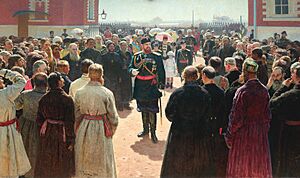
On the day he was killed, Alexander II had signed a paper to create groups that would advise the emperor. But when Alexander III became emperor, he followed Pobedonostsev's advice. He canceled this plan before it was even announced. He made it clear that his power would not be limited.
All of Alexander III's changes at home aimed to reverse the more liberal ideas from his father's rule. The new Emperor believed that sticking to Russian Orthodoxy, Autocracy, and Nationality (an idea from his grandfather, Nicholas I) would save Russia from revolution.
Alexander reduced the power of local elected groups called zemstvo. He put the administration of peasant villages under the control of landowners chosen by his government. These officials were called "land captains." These actions weakened both the nobles and the peasants. They brought the government more under the Emperor's direct control. In these policies, Alexander III listened to Konstantin Pobedonostsev. Pobedonostsev controlled the Church in Russia for a long time. He also became a teacher to Alexander's son and future emperor, Nicholas.
A severe famine in Russia from 1891 to 1892 caused many deaths. A cholera outbreak followed. The government struggled to handle the crisis. This allowed some liberal groups to help with relief efforts. For example, Leo Tolstoy helped on his estate.
Alexander wanted to make Russia more unified. This meant making the language and religion of all people in Russia the same. He made changes like teaching only the Russian language in Russian schools. This happened in areas like Germany, Poland, and Finland. He also strongly supported Eastern Orthodoxy. He worked to weaken German, Polish, and Swedish cultural and religious groups.
Alexander was not friendly towards Jewish people. During his rule, their economic, social, and political lives became much worse. His policies were put into action by officials in the "May Laws" of 1882. These laws encouraged anti-Jewish feelings. They led to many attacks on Jewish communities across the western part of the empire. As a result, many Jewish people moved to Western Europe and the United States. The laws banned Jews from living in rural areas and small towns. They also limited the types of jobs Jews could have.
The Narodnaya Volya group, encouraged by their success in killing Alexander II, planned to murder Alexander III. However, the secret police found out about the plot. Five of the people involved, including Aleksandr Ulyanov (the older brother of Vladimir Lenin), were caught and hanged in May 1887.
Foreign Relations
Alexander III was a man who wanted peace. But he believed that the best way to avoid war was to be ready for it. Diplomat Nikolay Girs was his Foreign Minister from 1882 to 1895. Girs helped create the peaceful policies that Alexander is known for. Girs was also key in forming the Franco-Russian Alliance in 1891. This alliance later included Great Britain, becoming the Triple Entente. This alliance helped France become more connected with other countries. It also moved Russia away from Germany and closer to France. France also gave Russia money to help its economy grow.
Girs was good at diplomacy, which means solving problems through talks and agreements. He helped define Russia's borders and calm dangerous situations. A big success happened in 1885. This settled long-standing tensions with Great Britain. Britain was worried that Russia expanding south would threaten India. Girs often managed to stop Tsar Alexander from being too aggressive. He convinced the Tsar that avoiding major wars was important for Russia's survival.
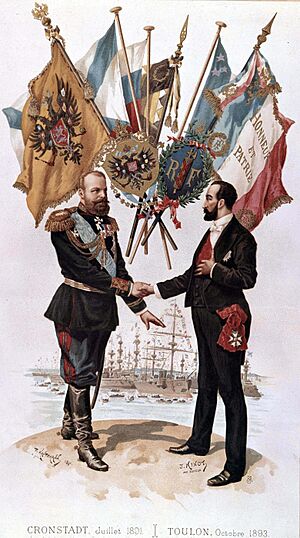
Even though Alexander was upset with German chancellor Otto von Bismarck, he avoided a full break with Germany. He even brought back the League of Three Emperors for a while. In 1887, he signed a special agreement with the Germans called the Reinsurance Treaty. However, in 1890, this treaty ended. This happened at the same time that Bismarck was fired by the new German emperor, Kaiser Wilhelm II. Wilhelm II's government did not want to renew the treaty. In response, Alexander III started friendly relations with France. This led to an alliance with France in 1892.
Despite cool relations with Germany, the Tsar kept many troops near the German border. He also showed self-control regarding Bulgaria. The efforts of Prince Alexander and later Stefan Stambolov to reduce Russian influence in Bulgaria made him angry. But he stopped any ideas to use military force.
In Central Asia, he continued Russia's policy of slowly expanding its control. He did this without causing conflict with the United Kingdom. He never let those who wanted a more aggressive policy get out of hand. His reign was not full of big events, but under his strong rule, Russia made good progress.
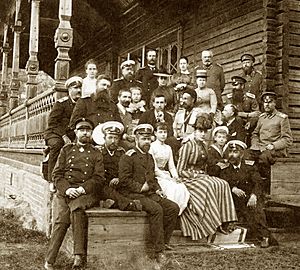
Alexander and his wife often spent their summers at Langinkoski manor in Finland. There, their children experienced a simpler, Scandinavian way of life.
Alexander did not like foreign influence, especially German influence. He wanted Russia to be the same in language, government, and religion. These ideas were different from his father's. Alexander II had some German sympathies and often spoke German privately.
Trade and Business
Alexander III started projects to help trade and business grow, just like his father had. Russia's economy was still recovering from the Russian-Turkish war of 1877–1878, which caused money problems. So, he put taxes on goods brought into the country. To help the budget even more, he made the government spend money more carefully and keep better records. Business and industry grew during his time as emperor. Also, during his reign, the building of the Trans-Siberian Railway began.
Family Life
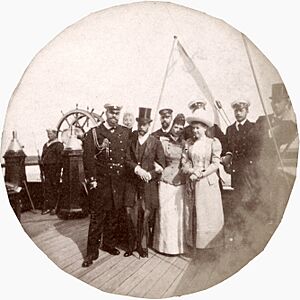
After his father was killed, Alexander III was advised that he might not be safe at the Winter Palace. So, Alexander moved his family to the Gatchina Palace. This palace was about 20 miles south of St. Petersburg. It was surrounded by moats, watch towers, and trenches. Soldiers guarded it day and night. He would sometimes visit St. Petersburg under heavy guard. Even then, he would stay in the Anichkov Palace, not the Winter Palace. Alexander did not like having to hide at Gatchina.
Alexander eventually grew very fond of Dagmar. By the end of his life, they loved each other deeply. A few weeks after their wedding, he wrote in his diary: "God grant that... I may love my darling wife more and more... I often feel that I am not worthy of her, but even if this was true, I will do my best to be." When she was away, he missed her greatly. In 1885, he asked Peter Carl Fabergé to make the first of the famous jeweled Easter eggs (now called "Fabergé eggs") for her as a gift. Dagmar loved the first egg so much that Alexander gave her an egg every year. After Alexander died, his son Nicholas continued this tradition.
Alexander had six children with Dagmar. Five of them lived to be adults: Nicholas (born 1868), George (born 1871), Xenia (born 1875), Michael (born 1878), and Olga (born 1882). He told Dagmar that "only with [our children] can I relax mentally, enjoy them and rejoice, looking at them." He was much more relaxed with his children than most European rulers. He told their teachers, "I do not need porcelain, I want normal healthy Russian children."
Alexander was worried that his oldest son and heir, Nicholas, was too gentle and innocent to be an effective emperor. He was concerned Nicholas had no experience with women.
Each summer, his wife's parents, King Christian IX and Queen Louise, held family gatherings in Denmark. Alexander, Maria, and their children would go to Denmark. His sister-in-law, the Princess of Wales, would come from Great Britain. His brother-in-law, King George I of Greece, would come with his family from Athens. Unlike the strict security in Russia, Alexander and Maria enjoyed the freedom they had in Denmark. Alexander once told the Prince and Princess of Wales that he envied them returning to a happy home in England, while he was returning to his "Russian prison." In Denmark, he enjoyed looking for tadpoles with his children, stealing apples from his father-in-law's orchard, and playing jokes.
Alexander had a very poor relationship with his brother Grand Duke Vladimir. Once, Vladimir got into a fight at a restaurant. Alexander was so angry that he temporarily sent Vladimir and his wife away. When Alexander and his family survived a train crash in 1888, Alexander joked, "I can imagine how disappointed Vladimir is going to be when he learns that we all stayed alive!"
Alexander had better relationships with his other brothers: Alexei (whom he made a grand admiral of the Russian Navy), Sergei (whom he made governor of Moscow), and Paul.
On October 29, 1888, the Imperial train crashed in an accident at Borki. At the time of the crash, the imperial family was in the dining car. Its roof fell in, and Alexander held up the remains of the roof on his shoulders while the children escaped outside. Doctors later believed that this accident caused his kidney problems.
Illness and Death
In 1894, Alexander III became very ill with a serious kidney disease. His cousin, Queen Olga of Greece, offered him to stay at her villa in Corfu, hoping it would help. But by the time they reached Crimea, they had to stop at the Maly Palace in Livadia. Alexander was too weak to travel further. Realizing the Tsar was dying, many royal relatives came to Livadia. Even the famous clergyman John of Kronstadt visited.
On October 21, Alexander met Nicholas's fiancée, Princess Alix of Hesse-Darmstadt. She had come from her home to receive the Tsar's blessing. Even though he was very weak, Alexander insisted on meeting Alix in his full uniform. This effort left him exhausted. Soon after, his health got worse quickly. He died in the arms of his wife, with his doctor present, at Maly Palace in Livadia on the afternoon of November 1, 1894. He was forty-nine years old. His oldest son, Nicholas, became the new emperor, Nicholas II.
After leaving Livadia on November 6, Alexander's body traveled to St. Petersburg. His remains were buried on November 18 at the Peter and Paul Fortress. Many foreign relatives attended his funeral. These included King Christian IX of Denmark, the Prince and Princess of Wales, and the Duke of York.
Monuments and Legacy
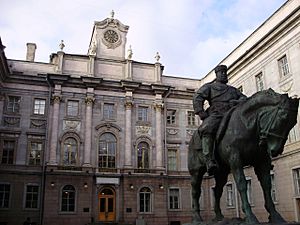
In 1909, a bronze statue of Alexander III on horseback was placed in St. Petersburg. The sculptor, Paolo Troubetzkoy, made the horse and rider very large. People nicknamed it "hippopotamus." Troubetzkoy said he wanted to show "an animal atop another animal." Many people, including the royal family, did not like the design. But the Empress Dowager surprisingly liked it, so it was approved. After the 1917 Revolution, the statue stayed as a symbol of the old rule until 1937. It was then put in storage. In 1994, it was put on display again in a different location. Another old memorial is in the city of Irkutsk.
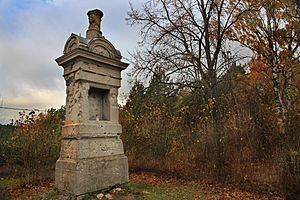
Because Alexander helped create the Franco-Russian Alliance, France built a bridge named in his honor, Pont Alexandre III. His son, Nicholas II, opened it, and it still exists today.
On November 18, 2017, Vladimir Putin unveiled a bronze monument to Alexander III in Crimea. The four-meter statue shows Alexander III sitting on a tree stump. An inscription says, "Russia has only two allies: the Army and the Navy." However, historians are not sure if the Tsar actually said these words. Alexander III is believed to be one of Putin's admired historical leaders. On June 5, 2021, another monument to Alexander was unveiled at Gatchina Palace.
Issue
Alexander III had six children with Princess Dagmar of Denmark, also known as Marie Feodorovna. Five of them lived to adulthood.
| Name | Birth | Death | Notes |
|---|---|---|---|
| Emperor Nicholas II of Russia | 18 May 1868 | 17 July 1918 | married Princess Alix of Hesse; had five children |
| Grand Duke Alexander Alexandrovich of Russia | 7 June 1869 | 2 May 1870 | died young from meningitis |
| Grand Duke George Alexandrovich of Russia | 9 May 1871 | 10 July 1899 | died from tuberculosis; had no children |
| Grand Duchess Xenia Alexandrovna of Russia | 6 April 1875 | 20 April 1960 | married Grand Duke Alexander Mikhailovich of Russia; had seven children |
| Grand Duke Michael Alexandrovich of Russia | 4 December 1878 | 13 June 1918 | married Natalia Sergeyevna Wulfert; had one child |
| Grand Duchess Olga Alexandrovna of Russia | 13 June 1882 | 24 November 1960 | married Duke Peter Alexandrovich of Oldenburg, then Colonel Nikolai Kulikovsky; had two children with Kulikovsky |
Images for kids
See also
 In Spanish: Alejandro III de Rusia para niños
In Spanish: Alejandro III de Rusia para niños
 | Emma Amos |
 | Edward Mitchell Bannister |
 | Larry D. Alexander |
 | Ernie Barnes |



